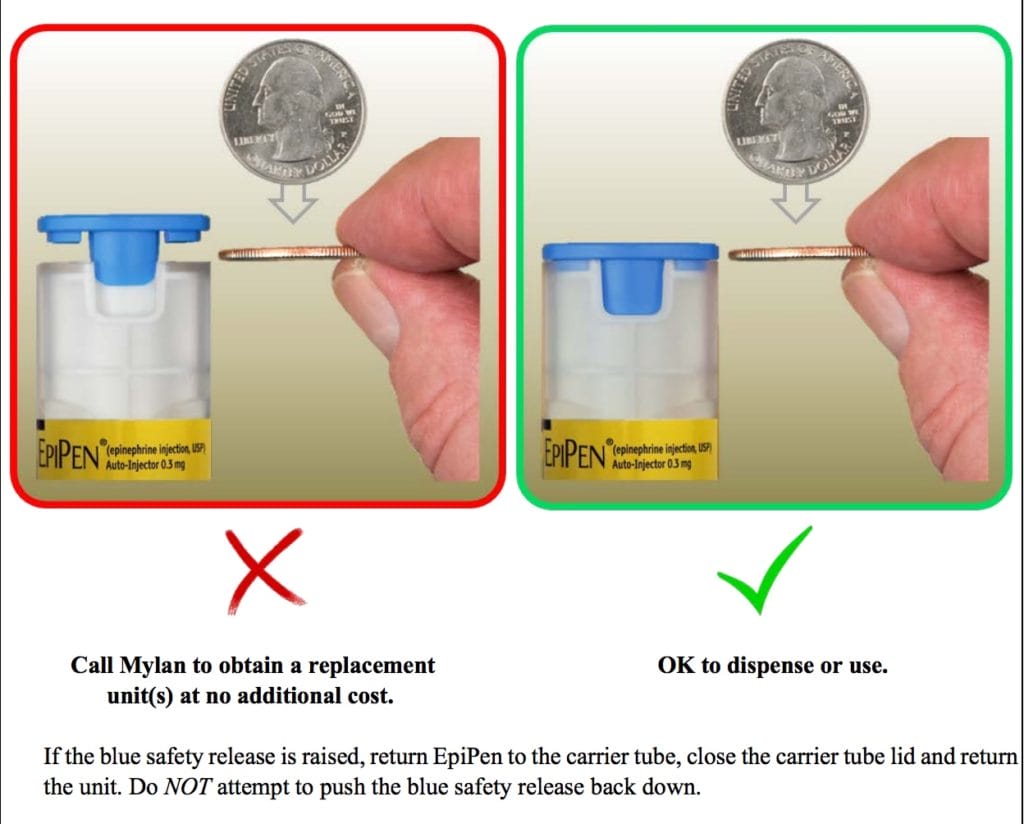
Allergic Living shares the following alert from the U.S. Food and Drug Administration from March 2020. It is based on a letter from manufacturer Pfizer and distributor Mylan which informs patients of possible EpiPen issues. Specifically, EpiPen® and EpiPen Jr® Auto-Injectors and their authorized generic versions may:
- Risk device failure due to spontaneous activation.
- May prove difficult to remove from the carrier tube.
- Lead to user errors.
Pfizer and Mylan say these EpiPen issues could delay or prevent emergency treatment when needed. Following is the FDA’s full release:
FDA alerts patients and healthcare professionals of EpiPen auto-injector errors related to device malfunctions and user administration.
The FDA is alerting patients, caregivers and healthcare professionals that EpiPen 0.3mg and EpiPen Jr 0.15mg auto-injectors, and the authorized generic versions, may potentially have delayed injection or be prevented from properly injecting due to:
- Device failure from spontaneous activation caused by using sideways force to remove the blue safety release.
- Device failure from inadvertent or spontaneous activation due to a raised blue safety release.
- Difficulty removing the device from the carrier tube.
- User errors.
In a [March 2020] letter to health care professionals from Pfizer, the manufacturer of the EpiPen, and Mylan, detailed how these devices may activate prematurely if the blue safety release is removed using a sideways force. For example, a user may try to hold a device with only one hand and try to remove the blue safety release with their thumb in a sideways force. Prior to use, the blue safety release should be removed by pulling straight up with one hand and holding the device with the other hand.
A very limited number of EpiPen devices also may have a blue safety release that is slightly raised. If the blue safety release is raised, the device may activate prematurely, which could potentially delay or prevent emergency treatment when needed.

Additionally, in some cases EpiPen devices may not slide out of their carrier tube easily, or potentially at all, due to a slight deformation on the rim of the carrier tube. The carrier tube is the immediate package in which the auto-injector is contained. In some cases, the patient or caregiver may not be able to quickly remove the auto-injector from the carrier tube.
The letter also describes specific user errors that can cause EpiPen issues and prevent the administration of the intended dose of epinephrine. For example:
- The device will not activate if the blue safety release is in place
- Ensure the needle end (orange end of the device) is in contact with the outer thigh (upper leg) prior to and during activation. The EpiPen device should be administered by swinging and pushing firmly against the outer thigh until it “clicks.” This signals that injection has started.
- Ensure the device is held in place for a minimum of three seconds following activation.
It is important for healthcare providers, patients and caregivers to periodically review the EpiPen user instructions and practice using the EpiPen trainer to ensure proper understanding and utilization of the EpiPen auto-injector.
It is vital for lifesaving products to work as designed in an emergency situation, and patients and caregivers should inspect their epinephrine auto-injector prior to needing it to ensure the blue safety release is not raised and that the device can be easily removed from the carrier tube.
Patients should contact Mylan Customer Relations at 800-796-9526 if they find an issue with their auto-injector and to obtain a replacement at no additional cost.
Pharmacists should inspect the products before dispensing them to patients to ensure quick access to the auto-injector and should not dispense any product which does not easily slide out of its carrier tube or has a raised blue safety release. As stated on the product label, consumers should always seek emergency medical help right away after using their epinephrine auto-injector.
FDA is aware of adverse event reports associated with EpiPen products. FDA asks health care professionals and consumers to report any adverse reactions or quality problems to the FDA’s MedWatch program:
- Complete and submit the report online at www.fda.gov/medwatch/report.htm.
- Download and complete the form, then submit it via fax at 1-800-FDA-0178.
Pfizer / Mylan Letter on Safety Points:
• Avoid removing the blue safety release with sideways force. This may cause premature activation. Can occur if trying to remove the release or cap with one hand.
• Watch for a very limited number of EpiPen devices that may have a blue safety release that is slightly raised. If you have one, the device might activate prematurely. The letter asks pharmacists and consumers to inspect their newly purchased EpiPens. As FDA letter specifies above, contact Mylan for a replacement if you have this issue.
• Read the full letter – here – including carrier tube concerns in a limited number of devices, and for some user issues identified by the manufacturer.





